Respondents
Natalie Adams (Information Services Manager, Churchill Archives Centre) – hereinafter (NA)
Susan Corrigall (Copyright Officer at the National Records of Scotland) – hereinafter (SC)
Ronan Deazley (Professor of Copyright Law, University of Glasgow) – hereinafter (RD)
Judith Etherton (Freelance Archivist) – hereinafter (JE)
Peter Hirtle (Research Fellow, Harvard University) – hereinafter (PH)
Peter Jazsi (Professor of Law, American University) – hereinafter (PJ)
Rachel MacGregor (Senior Archivist, Library of Birmingham) – hereinafter(RM)
Tim Padfield (International Council on Archives) – hereinafter (TP)
Lesley Richmond (University Archivist and Deputy Director, University of Glasgow Library) – hereinafter (LR)
Matt Sag (Professor of Law, Loyola University) – hereinafter (MS)
Victoria Stobo (Research Assistant and Postgraduate Researcher, CREATe, University of Glasgow) – hereinafter (VS)
Anna Vernon (Licensing and Copyright Assurance Manager, British Library) – hereinafter (AV)
Cathy Williams (Head of Collections Knowledge, TNA) – hereinafter (CW)
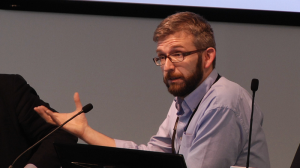 RD: The next steps plenary has just begun. What is it that you can do as sector to begin to push back on some of these issues? Let me tell you a little bit about… the scoping project was really the first stage in a longer project that Victoria will be undertaking as you all heard earlier on. She is in week one of a PhD. We have no idea, and we haven’t begun to think about project design yet, but this has been enormously useful actually in terms of shaping, well I’m speaking for Victoria, but shaping Victoria’s thoughts on that. But that’s a long term project, so that’s a three year endeavour in which Victoria is going to hope to engage with the archive community in the UK and elsewhere, and think about exactly these issues. But we have also heard today, Nick Munn wants to hear from archivists and too often the archival voice just isn’t being heard by policymakers and by the legislature. You are absolutely right, Matt, it’s not really the judges that we need to be talking to here, it’s the policymakers. He’s asked for input from this sector, at the moment we’ve got the exceptions that have gone through their technical review and it is almost certainly too late to begin to… what we are getting I think we’re getting, but there are other things coming up. The orphan works deadline, implementation October 2014, how will the licencing body, the licencing authority, how will it understand what it means to talk about diligent search in relation to the digitisation of archival collections, as opposed to library collections. I think those are two very different things. But if we are not putting something on the table for them to think about, in the way that Peter has done through his best practices work, talking to stakeholder communities, getting those communities to develop and articulate their norms of practice, what is it that we think is fair use? We can’t articulate those norms in the UK because we don’t have fair use, but we can begin to articulate norms around what a reasonable fee is when you’re trying to clear rights in an orphan work as part of an archival project. Probably zero, probably. What does it mean to engage in diligent search for archivists trying to make this material accessible for non-commercial or perhaps commercial reasons? Are there different standards that we need to think of? But that needs to come from the community; it follows on from Martin’s question, it pays heed to the advice that we’re getting here. Peter used a phrase that I’m going to start using and I’m going to start encouraging archivists to use and that is – “Well, technically it’s not in the law right now, but we hope it will be at some future point.” That’s a good phrase to use, but the question is, you’re here as representatives of the archive community, what are the next steps? How do we push back? Thoughts, comments, and again if we can use mics. Victoria, is there a second mic?
RD: The next steps plenary has just begun. What is it that you can do as sector to begin to push back on some of these issues? Let me tell you a little bit about… the scoping project was really the first stage in a longer project that Victoria will be undertaking as you all heard earlier on. She is in week one of a PhD. We have no idea, and we haven’t begun to think about project design yet, but this has been enormously useful actually in terms of shaping, well I’m speaking for Victoria, but shaping Victoria’s thoughts on that. But that’s a long term project, so that’s a three year endeavour in which Victoria is going to hope to engage with the archive community in the UK and elsewhere, and think about exactly these issues. But we have also heard today, Nick Munn wants to hear from archivists and too often the archival voice just isn’t being heard by policymakers and by the legislature. You are absolutely right, Matt, it’s not really the judges that we need to be talking to here, it’s the policymakers. He’s asked for input from this sector, at the moment we’ve got the exceptions that have gone through their technical review and it is almost certainly too late to begin to… what we are getting I think we’re getting, but there are other things coming up. The orphan works deadline, implementation October 2014, how will the licencing body, the licencing authority, how will it understand what it means to talk about diligent search in relation to the digitisation of archival collections, as opposed to library collections. I think those are two very different things. But if we are not putting something on the table for them to think about, in the way that Peter has done through his best practices work, talking to stakeholder communities, getting those communities to develop and articulate their norms of practice, what is it that we think is fair use? We can’t articulate those norms in the UK because we don’t have fair use, but we can begin to articulate norms around what a reasonable fee is when you’re trying to clear rights in an orphan work as part of an archival project. Probably zero, probably. What does it mean to engage in diligent search for archivists trying to make this material accessible for non-commercial or perhaps commercial reasons? Are there different standards that we need to think of? But that needs to come from the community; it follows on from Martin’s question, it pays heed to the advice that we’re getting here. Peter used a phrase that I’m going to start using and I’m going to start encouraging archivists to use and that is – “Well, technically it’s not in the law right now, but we hope it will be at some future point.” That’s a good phrase to use, but the question is, you’re here as representatives of the archive community, what are the next steps? How do we push back? Thoughts, comments, and again if we can use mics. Victoria, is there a second mic?
AV: It’s Anna Vernon again from the British Library, I wouldn’t necessarily presume that the exceptions that are proposed are going to go through as they stand, and that is my biggest fear really, that we need to express our support quite vocally.
RD: You mean they may not go through at all?
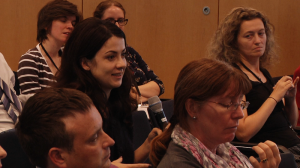 AV: Well, they might not go through as they currently stand, because the right holders have so much access to ministers and politicians, so they might not happen in their current form really and that’s my worry, that we are not articulating how important they are.
AV: Well, they might not go through as they currently stand, because the right holders have so much access to ministers and politicians, so they might not happen in their current form really and that’s my worry, that we are not articulating how important they are.
RD: But then we have a tighter deadline than we thought, in terms of collective action. Yes?
JE: [Judith Etherton] I think in England we base a lot of our legal judgments on case law and I’m sitting here and I’m thinking as an archivist, I am aghast that the Women’s Authors or whatever, put up the whole of their collection without checking anything at all. That would frighten me to death, but if we’ve got to start somewhere, the Wellcome has set parameters for their project and maybe the way forward for us, here in the UK, is to take what they’ve done and start doing a whole series of mass digitisation projects. Based on how they have done it, come together as a consensus, don’t check everything, take a bit of risk, or get a little bit encouraged that the risk is okay, because at the moment I don’t think we’ve got any case law, and then by that time we’ll have a head of steam. Then if somebody does sue somebody else, we’ll actually have the proof that this has been going on for a while, and we’ve got lots of cases and people might come down then in our favour, if you see what I mean. We just need to get started and do a lot more.
MS: While the microphone is going back, I will just throw in a quick comment. My biggest concern is that you move from an environment where you have to make these difficult risk assessments, to an environment where you are not allowed to make risk assessments, where the only way to do this is through some complicated, bureaucratic, statutory process that has such high administrative costs that are so inapplicable to your particular archives and its needs, that it is literally worse than nothing. There is a huge danger than any kind of extended collective licensing scheme, just becomes an extended arbitrary tax regime. The more of these projects that there are in evidence that demonstrate that the median licence fee is zero, and that these things can be done without the world falling apart, the better. Obviously then it is important that they are all done well, for that exact same reason.
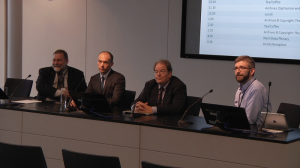 PJ: Could I add one thing and that is that what has just been said makes a great deal of sense to me, and it does also seem to me, from what I heard this morning, that the practices that are emerging in the Wellcome projects could be a very good way to start. I would have one piece of advice about how to articulate that approach and that is when explaining, for example, why you don’t check the location of every copyright owner, why you make decisions about which copyright owners it makes sense to check, I would at least consider, for external consumption, casting those policies in some frame other than risk. I would urge you to consider casting those statements of policy, in terms of what archivists believe represents an appropriate level of fidelity to the underlying values of the copyright system. Because if you present to the world a set of practices, and then explain that the reason you are doing these things is because you think they are what you can get away with, that is not impressive and it could even lead to some backlash. As I tried to say before, I don’t doubt for a moment that there is an important element of risk assessment here, but I think that to frame the working principles on which you proceed, entirely in that vocabulary, could well be self-defeating.
PJ: Could I add one thing and that is that what has just been said makes a great deal of sense to me, and it does also seem to me, from what I heard this morning, that the practices that are emerging in the Wellcome projects could be a very good way to start. I would have one piece of advice about how to articulate that approach and that is when explaining, for example, why you don’t check the location of every copyright owner, why you make decisions about which copyright owners it makes sense to check, I would at least consider, for external consumption, casting those policies in some frame other than risk. I would urge you to consider casting those statements of policy, in terms of what archivists believe represents an appropriate level of fidelity to the underlying values of the copyright system. Because if you present to the world a set of practices, and then explain that the reason you are doing these things is because you think they are what you can get away with, that is not impressive and it could even lead to some backlash. As I tried to say before, I don’t doubt for a moment that there is an important element of risk assessment here, but I think that to frame the working principles on which you proceed, entirely in that vocabulary, could well be self-defeating.
MS: Peter would you say that they should say when they are doing diligence, that they are just confirming their implied licence?
PJ: That’s one possibility, I think. I don’t have that articulation. What I would say is that what we are doing here is what we think we can do to advance the interests that are represented in the copyright law consistent with the fulfilment of our cultural mission. We are making that balance and whether the law literally gives you a warrant to make that balance, is quite irrelevant to that articulation. Again what I wouldn’t say, is that this is what we are doing because this is what we think we can do without getting into trouble.
NA: Natalie Adams from Churchill Archive Centre again, I completely agree we should build on the lessons from the Wellcome, one of the practical things we can do, I think, is I worked on the clearance of the Churchill papers and the Wellcome worked on the Codebreakers clearance, I have got a database of copyright holders with a lot of contact details, and so have the Wellcome. We need to make it easier when we are doing our due diligence and we’ve decided to contact people, we need to make it easier for people to contact the people who someone has traced. Because of data protection, I can’t see that I can publish my database of contact details, but we should be sharing that information, even if I am forwarding approaches for people, I think that would be a really practically useful thing.
RD: Yeah, thank you for that.
PH: Well of course, in theory, you should be able to give it to David Sutton and the WATCH project and they do then secure permission from the contact listed in the database, in order to be able to have that information listed there, so it is all done with permission. So, wouldn’t that protect it?
NA: I think I could explore that, I think the different sorts of people I have in my database, they are not really those writers and authors who’ve created a work for gain, they are more the A N Other people, so I’m not sure whether they are a natural fit with that database, but maybe that is something that we could do, take that into a broader direction?
PH: Well it does say writers, artists and copyright holders, that last one, but I don’t know whether that project of literary collections, how interested they are in expanding the scope of it, do you know Tim?
TP: Yes, David Sutton certainly does want to expand it, and I think the answer is talk to David Sutton, ask if he’s happy to take the material on and I’d be very surprised if he weren’t.
RD: Step one? Yes.
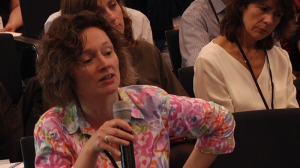 SC: [Susan Corrigall] I was just going to say my experience of using the WATCH database in the National Records of Scotland is in over ten years, I’ve found one. And I’ve been looking up some people who, to me, were well know, very well known, quite productive, prodigious producers of works. So, I think the usefulness of the WATCH file - it very much depends on the nature of your collections, but that is perhaps an argument for expanding it.
SC: [Susan Corrigall] I was just going to say my experience of using the WATCH database in the National Records of Scotland is in over ten years, I’ve found one. And I’ve been looking up some people who, to me, were well know, very well known, quite productive, prodigious producers of works. So, I think the usefulness of the WATCH file - it very much depends on the nature of your collections, but that is perhaps an argument for expanding it.
PH: Well, this just points out the need for registries and I think even in Europe with things like the Arrow Project, there’s a recognition that it’s really useful to know who copyright owners are, and to me the ideal orphan works system would be to sit down and say let’s run our 3,000 names against a registry, and if there’s a hit that’s great, and if not, you can go ahead and use it for non-commercial purposes until such time as somebody wants to add their name to the registry, but again I’m dreaming there.
RD: But again Arrow is published works.
PH: Published works.
RD: Yeah, so there is a real problem of fit in terms of…
PH: But not really, because why not have a registry for unpublished works as well, if you don’t want to have your things be available for non-commercial scholarly use, then you add your name to the registry, but otherwise until you do, it’s there. Formalities, that’s a solution, right? [Laughter]
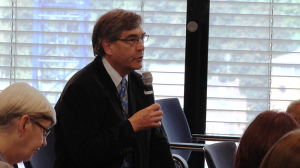 TP: In a sense we are getting formalities and we’ve got the Copyright Hub which is currently in the process of being created in the UK and what it’s intending to do is provide links to databases of rights owners and material in which they own rights, so there actually will be nothing to stop the archival community setting up a database of rights owners, and seeking to have it accessible through the hub.
TP: In a sense we are getting formalities and we’ve got the Copyright Hub which is currently in the process of being created in the UK and what it’s intending to do is provide links to databases of rights owners and material in which they own rights, so there actually will be nothing to stop the archival community setting up a database of rights owners, and seeking to have it accessible through the hub.
RM: Rachel Macgregor, Library of Birmingham . Obviously, this idea of having a database of rights owners is great for certain collections, but we are going back to the kind of ...and I was interested to see the iconography of the Barak Obama collection, we have got a lot of collections like that produced by unknown people, representing things happening in our city, different communities, so this is good to a point, but we still need to move forward on lots of modern collections which there is no point even going there with a rights registry because it is not going to fit that need at all. I don’t have any suggestions as to what you are supposed to do, but just sort of bringing us back to that point, and I think it will be good to continue that discussion around how we do that. I think it is using guidelines, I am sure it is, but I think the community, the archival community does need to take the lead on that.
RD: Can I just ask one other question then, what is the appropriate forum or fora for having these discussions and who should take the lead? Lesley?
LR: You are going to dark waters here.
VS: What about the Library and Archives Copyright Alliance ?
RD: Yeah, sure.
VS: Possibly, I’m not sure. Anyone from the Library and Archives Copyright Alliance in the room?
TP: I’m glad to say I am no longer the chairman of it. Naomi Korn has taken over as chair of LACA. And she is trying to be terribly active, but how active she can be must be limited simply as a consultant as well and has to do a certain amount of work to bring in money. But yes LACA certainly exists, and could be a forum for publishing material, I’m not sure how much actual work it could do. It might set up meetings or something of that sort, but you’d need to talk to Naomi to start with, or if people wanted me to I could take it to the next meeting which is the end of October I think, or early November.
RD: I think that would be a very useful thing to do and maybe that is something we can talk about Tim, and the National Archives , do they have a role to play in this? That’s a leading question. Maybe I’ll leave that hanging in the air.
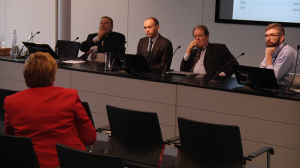 LR: There is certainly the Archive and Records Association .
LR: There is certainly the Archive and Records Association .
RD: Sure, of course.
LR: If he [David Mander] was still here, he would.
RD: He would be saying yes. Yeah, I think that’s absolutely right.
PJ: So could I ask a related question? Because one of the things you heard, and I actually think that it was incredibly powerful and is incredibly powerful, and that in his modesty Matt Sag may not have explained how powerful it was, you heard the story that the impact that this brief by scholars had in these various copyright litigations. The effect that having the users of these services come forward and say this stuff is actually very important in order for us to do the research that we can do, and to produce the benefits for the culture that that research will yield, we need a certain level of archival access. We need our archives in effect to be doing certain things, and I’m very curious whether in your view it might be possible to mobilise a somewhat larger community of interests, including the various academic, commercial and other consumers of your services, around these issues. Because I think as long as it is only archivists, no matter how articulate and no matter how persuasive, this may seem to policymakers, ironically the very policymakers who are on the other hand pressuring you to make more material available on-line, like a form of special pleading. If it would be possible to broaden the base of whatever campaign you have in mind, I think it might add considerably to its effectiveness.
RD: So this is one of the reasons why I described Peter Jaszi as one of the foremost thinkers on copyright earlier, and I often ask myself in situations like this, well what would Peter Jaszi do? He is unerring with his advice, and mentoring, and guidance, and I think that is really something that as a community we should also take on board, in terms of thinking about what our next steps are.
SC: National Records of Scotland , you mentioned the National Archives, Ronan. I’m going to make an observation in terms of policy here. I work for a government body, and that gives me and my institution certain problems in relation to risk, because obviously the risk is minimal in terms of being sued and damages and all of that, I completely get that. However, I work for the government, I am a civil servant, we pass laws and it’s a pretty tricky one for us to buy that risk, to knowingly break the law on the one hand and on the other hand I am thinking of things like Archives Accreditation which is kind of, I’m just looking to see if Cathy Williams is still here, coming from central government archives community and one of the things in there, for instance, is demonstrable respect for third party rights, and what I am seeing here, is there is a divergence. On the one hand there are arguments for increased appetite for risk for understandable reasons, but on the other hand there are these policies and frameworks and so on, coming from one arm or another arm of central government, which have to respect the law however silly or trivial the law might be. I don’t have any answers to this divergence, but I think it’s something that we can’t forget as a community either.
RD: I absolutely see that, but obviously as a community there are, in terms of articulating norms of practice around due diligence, that are not about appetite for risk and or, just going ahead and digitising, there is a role that the whole community clearly can come together and begin to think about and discuss those issues with a view to trying to set out some sensible policies that the policymakers might take on board, or the new licensing authority might take on board when considering what’s an appropriate fee to charge archivists, whether public sector, private sector, in engaging in activities like this. You are right, there are two streams, I think, that we might begin to think about or begin to progress work on, but I mean, certainly any kind of debates around those sorts of issues that didn’t include input from the National Archives, I think it is really important that you are involved in those processes. Tim?
TP: Can I just say one thing in response to what Peter said about high profile people and so on. In Marrakesh a few months ago, we had an international treaty on exceptions to copyright in favour of the visually disabled, and that was significantly helped by the presence of a person called Stevie Wonder, who supported the campaign and he went to Marrakesh and he performed there and so on. If any archivists can think of a Stevie Wonder in the archival world then it might help, but certainly at WIPO in Geneva we and the librarians are trying to think of people who could come to Geneva and take a fairly high profile part in negotiations, or at least in trying to persuade member states that this is something worth doing.
RD: Thanks Tim.
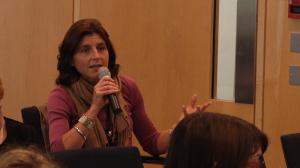 CW: Just to pick up from my colleague from the NRS, TNA is in a slightly different position because we are both an agency of the Ministry of Justice and therefore directly linked to central government, but we also have mandate from the DCMS (Department for Culture, Media and Sport) and we have done over the last two years, to be acting as leaders for the archive sector. So, we tread a really quite interesting path. We would advocate, I would say, for something that is proportionate, hence my comments before about this stuff wouldn’t exist anyway, if we weren’t doing a damn good job of keeping it. So TNA’s role, yes it’s a fine line, but TNA’s role is to engage or support or facilitate, pick a word, conversations like this. To broker partnerships between members of the sector, between the sector and other key sectors, so I absolutely agree with bringing in support from our legal colleagues, ensuring that archives are working right across the Cultural Heritage sector, and our role really is to try and create some kind of hub for these discussions, even if we have to sort of then step aside and let the sector speak for itself, but that is TNA’s dual role and we do find it quite challenging, but our access to the corridors of power, in some ways, can help us to support these conversations. So, do use us. At the moment we are gathering feedback through a consultation on how you all think we’re doing as archive sector leaders, and I think one of the practical things you could do is all shout about, you’re doing great by the way - add that first, but copyright. So, we will respond and it gives us weight to open those conversations with government. We are supposed to tell government what the impacts of policy is having on you guys, and feeding it back to them, so that the policymakers in the future can take into consideration the regulatory impact. So we can’t do that unless we are hearing from you. So please do tell us, and we can take your mandate to actually really engage in conversations like this.
CW: Just to pick up from my colleague from the NRS, TNA is in a slightly different position because we are both an agency of the Ministry of Justice and therefore directly linked to central government, but we also have mandate from the DCMS (Department for Culture, Media and Sport) and we have done over the last two years, to be acting as leaders for the archive sector. So, we tread a really quite interesting path. We would advocate, I would say, for something that is proportionate, hence my comments before about this stuff wouldn’t exist anyway, if we weren’t doing a damn good job of keeping it. So TNA’s role, yes it’s a fine line, but TNA’s role is to engage or support or facilitate, pick a word, conversations like this. To broker partnerships between members of the sector, between the sector and other key sectors, so I absolutely agree with bringing in support from our legal colleagues, ensuring that archives are working right across the Cultural Heritage sector, and our role really is to try and create some kind of hub for these discussions, even if we have to sort of then step aside and let the sector speak for itself, but that is TNA’s dual role and we do find it quite challenging, but our access to the corridors of power, in some ways, can help us to support these conversations. So, do use us. At the moment we are gathering feedback through a consultation on how you all think we’re doing as archive sector leaders, and I think one of the practical things you could do is all shout about, you’re doing great by the way - add that first, but copyright. So, we will respond and it gives us weight to open those conversations with government. We are supposed to tell government what the impacts of policy is having on you guys, and feeding it back to them, so that the policymakers in the future can take into consideration the regulatory impact. So we can’t do that unless we are hearing from you. So please do tell us, and we can take your mandate to actually really engage in conversations like this.
RD: Thank you very much for that. I think that’s a really powerful and useful intervention. Any other comments or thoughts?
So we’re almost exactly on time which is extraordinary. I’d like to invite you first to thank our very distinguished panel for their effort and their time and their commitment and their thoughts.
[Applause]
RD: And I would like to, and I know I am the person who stands between you and a glass of wine or a bottle of beer, I’m hoping there’s beer, Sue is giving me the nod there is beer. I’d like to thank a few more people. I’d like that thank Research Councils UK for supporting CREATe ; the AHRC , the ESRC and the EPSRC . I’d like to thank Wellcome again for letting us in and for staging this event, their support has really been invaluable and, in particular, I’d like to thank Sue Davies who has now disappeared, perhaps she knew this was coming. Sue has been extraordinary in terms of her support and time and commitment to this project and we wouldn’t be here if not for Sue, and that also goes for Victoria Stobo as well, who has been the research assistant on this project and I am sure a lot of you have been liaising with in the run up to this event. I would just like to then thank all of you for coming along, for staying for the day, for engaging in the conversation, and hopefully it is the start of a conversation that we can continue with the support of the TNA and other representative organisations. Thanks very much.
For a full transcript of the open discussion, and to leave feedback on that discussion, click here.
